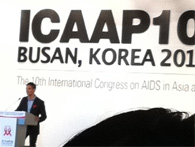This article was first published by the Asia Pacific Coalition on Male Sexual Health (APCOM) on Aug 29, 2011:
Like all opening ceremonies at global conferences, the inauguration of the 10th International Congress on AIDS in Asia and the Pacific on 26th August 2011 wasn’t short on speeches or pomp and circumstance. South Korean officials welcomed the 2000 or so delegates. The UNAIDS chief Michel Sidibe reiterated his organisation’s advocacy and “zero vision” statement, supported by Nafis Sadik, the UN Secretary-General’s Special Envoy on HIV/AIDS in Asia and the Pacific. Officials from the World Health Organisation, the Global Fund and the Asian Development Bank made remarks that complimented and complemented each other. There was a moment of drama when protesters interrupted the South Korean Health Ministry’s address, demanding that the government take concrete steps to address debilitating discrimination against the LGBT community, ensure that trade agreements wouldn’t sacrifice universal access to anti-retroviral medication, and a host of other long-simmering issues.

Towards the end of a long evening at the BEXCO conference center in this Korean port city, two speakers representing civil society delivered the “Community Report,” representing the range of communities particularly affected by HIV – including sex workers, women, youth, migrants, people who use drugs, transgender people and men who have sex with men. Rishita Nandagiri of the Women’s Global Network for Reproductive Rights spoke of issues that are the focus of her coalition, as well as the need for the creation of “safe spaces” for civil society to express itself, for vulnerable populations to be decriminalized and for all marginalized communities to be included as part of the decision-making process on matters pertaining to their health and empowerment.
And then it was the turn of Nandagiri’s co-presenter, a tall, slender young man. “Anyong haseyo. Good evening friends. My name is Laurindo Garcia, I am Filipino, working as coordinator of two regional networks for men who have sex with men and transgender people, and the Founder of B-Change Foundation.”
In a voice not particularly loud, yet firm in his delivery, Garcia continued, “What is clear -- at least from where I am standing -- is that in order for us to make any progress, we need to build alliances and seek partnerships, for together we create critical mass. I am talking about partnerships like the one we have for you tonight, where Rishita and I stand here before you to present a unified voice for communities living with, and affected by HIV. It’s partnerships like this -- where the gay lesbian, gay, bisexual and transgender community, that includes people like me -- can stand in solidarity with advocates seeking health and opportunities for women and children, as well speaking for OTHER groups most-affected by HIV.”
Noting the very real progress made globally in recent years in addressing HIV, including the work done by many progressive governments, but also acknowledging the huge challenges that remain and the fact that for an individual seeking to make a difference there are so many factors beyond one’s immediate control, Garcia asked the audience comprising of top UN and government leaders, dignitaries and donors, “So, how can we bring this prospect of change back into our own hands? How can we make that ‘change we want to see’... something more tangible, something more human? For example, what change can you accomplish, so that your family would welcome a son or daughter, nephew or niece, uncle or aunt who turns out to be gay, lesbian, bisexual or transgender?”
“What change can you spark, that would inspire the leaders of your local mosque, church or temple to resolve that in face of disagreement on issues of faith, there should be at the very least - in my opinion – the agreement to do no harm. If we can get some of these things right, if we can see ourselves as part of the solution, or better yet, instigators of the solution, then we may be on the right path to disrupt the drivers of HIV in this world.”
As pin-drop silence descended on the cavernous room, Garcia expanded on his theme, impassioned yet calm. “And as we consider the work that lies before us and realise we have the power to change -- to change the hearts and minds, of people in our professional and social networks -- let us remember that HIV also has a human voice. In fact many, many diverse and varied voices, which we must be ready to respect and empower. And at the same time, it is up to us -- and by that I mean people living with HIV like me -- to lead by example and show the world that we are capable, talented and inspirational.”
As applause erupted, Garcia – only the second HIV positive person to ever address an ICAAP opening plenary since the 3rd ICAAP in Yokohama, Japan, 17 years ago – pressed on. “It is up to us to have the loudest voice in the room -- like our Korean LGBT friends showed us earlier tonight -- and demand, DEMAND universal access to care, treatment and support for all people living with HIV, no matter where they are in the world, whether it’s within your home country or across national borders. Because doing so makes economic sense. But more importantly, because it makes human sense.”
As Garcia’s speech ended, he received a standing ovation from many in the audience, UNAIDS’ Michel Sidibe included. A human voice from a pandemic now in its fourth decade soared above the rhetoric, moved hearts and minds, and reminded all those gathered what their work was really all about – or should be about.
The theme for World AIDS Day 2011 is “It takes a village.” On the night of August 26, 2011, at the 10th ICAAP in Busan, it took one man living with HIV to move the world.
